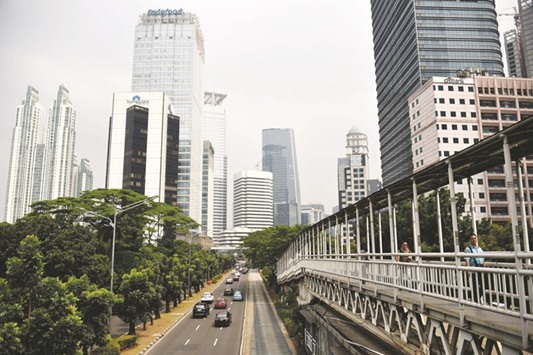Fund managers say the investment grade from S&P, which matches the ratings awarded by Fitch and Moody’s years ago, will give Indonesia access to a wider pool of investors.
A rating upgrade usually also means an economy can get cheaper borrowing costs when it issues bonds.
S&P upgraded Indonesia’s sovereign credit outlook to BBB-, its lowest investment grade, up from the previous junk status of BB+. The agency gave the new rating a stable outlook.
“It’s about time,” Wellian Wiranto, an economist at OCBC Singapore wrote in a report on the upgrade headlined: “Better late than never”.
Fitch upgraded Indonesia to investment grade in December 2011 and Moody’s in January 2012.
The main stock index in Jakarta spiked to be up more than 3% after the S&P upgrade, the biggest intraday percentage rise since October 2015, and gained 2.6% for the day.
The rupiah currency also rose and Indonesian dollar bonds rallied.
“Winning the investment grade title allows Indonesia access to a wider investor base.
This rating upgrade should drive valuations higher,” said Taye Shim, an analyst at Mirae Asset Sekuritas Indonesia.
S&P said the upgrade reflected its assessment of reduced risks to the country’s fiscal position.
“Indonesia’s increased focus on realistic budgeting has reduced likelihood that shortfall in future revenue would widen general government deficit significantly,” it said. Gundy Cahyadi, an economist at DBS in Singapore, said the upgrade was a “clear indication of Indonesia’s improved fundamentals in recent years and investors’ acknowledgement of it”.
While there may only be a “knee-jerk” positive reaction from markets, Cahyadi said the most significant impact was likely to be on foreign direct investment.
Indonesia is trying to lure investors for a $450bn infrastructure drive to revive economic growth.
S&P had previously not followed the upgrade to investment status by other big ratings agencies due to a host of concerns.
It gave Indonesia a positive outlook in May 2015 for President Joko Widodo’s bold move to remove gasoline subsidies.
In June last year, it denied Indonesia its coveted investment grade again, citing weak government revenue collection and worsening corporate credit quality.
After that, Widodo reshuffled his cabinet and appointed the respected former managing director of the World Bank, Sri Mulyani Indrawati, as his finance
minister.
She then ran a tax amnesty programme that many said was the world’s most successful and is currently overseeing a plan to overhaul the taxation system.
Bharat Joshi, investment director at Aberdeen Asset Management in Jakarta, said the upgrade should cut Indonesia’s cost of funds, which is relatively expensive compared with regional peers.
Indonesia dollar bonds jumped by over a point with the bonds due 2027 now indicated at 104.625/105 cents on the dollar.
The cost of insuring against default on its sovereign debt also fell.
The 5-year CDS was down 6 basis points at 125/130 bps. Bank Indonesia governor Agus Martowardojo welcomed the S&P upgrade.
BI has said Indonesia deserved an investment grade after a host of improvements in its external balance, including a narrower current account deficit.
Indrawati said the government would now focus on keeping the state budget credible and effective.
“Indonesia will try to reach its development goals without having to resort to an unsustainable budget,” Indrawati said, adding that the upgrade could help boost investment and allow Indonesia to reach economic growth of 5.4%-6.1% in 2018.
In recent quarters, Indonesia has had annual growth of 5% or less.

